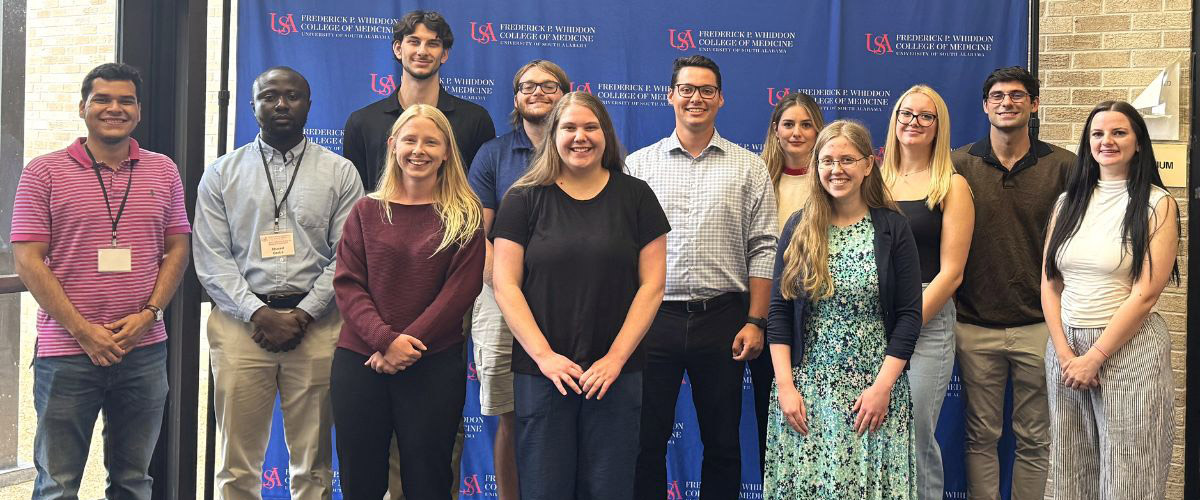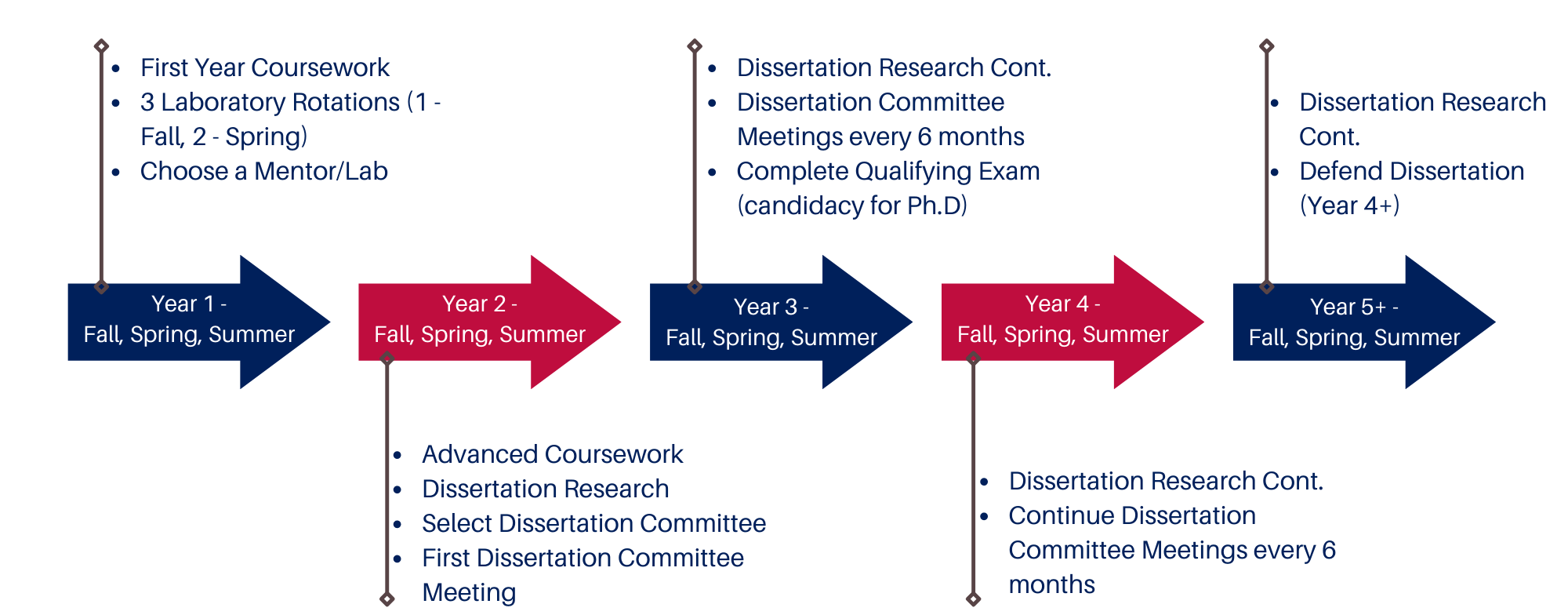Basic Medical Sciences Graduate Program Overview

Welcome to the Basic Medical Sciences Graduate Program at the University of South Alabama Frederick P. Whiddon College of Medicine!
As Director of the Basic Medical Sciences Graduate Program, it is my privilege to introduce you to an intellectually stimulating and collaborative environment where scientific discovery flourishes. Our program is committed to cultivating the next generation of biomedical researchers, equipping them with the knowledge, skills, and critical thinking necessary to push the boundaries of medical science.
At the heart of our mission lies a steadfast dedication to nurturing scientific curiosity and analytical rigor. We challenge our trainees to think objectively, question assumptions, and approach complex biomedical problems with precision and innovation. Through a carefully designed curriculum, immersive laboratory experiences, and dynamic scholarly discussions, we provide an enriching environment where students sharpen their ability to dissect intricate challenges and develop novel, evidence-based solutions that drive meaningful progress in biomedical research.
The University of South Alabama College of Medicine fosters an inclusive and supportive learning atmosphere, where students engage in cutting-edge research and benefit from interdisciplinary collaborations. With access to state-of-the-art facilities and mentorship from visionary faculty leaders, our trainees gain not only the technical expertise but also the adaptability and leadership skills needed to excel in academia, industry, and healthcare.
Whether you are a prospective student eager to embark on a journey of discovery, a current researcher expanding your expertise, or a collaborator interested in our work, I invite you to explore our program and witness the wealth of opportunities that await. We look forward to welcoming you into our scientific community and supporting your pursuit of academic and professional excellence.
Robert A. Barrington, Ph.D.
Director, Basic Medical Sciences Graduate Program
Frederick P. Whiddon College of Medicine
The doctoral program awards the Ph.D. degree in Basic Medical Science and is designed for students interested in careers in biomedical investigation.
The program provides training which can lead to academic careers in universities, medical institutions, or to a wide variety of research or administrative positions in government, non-profit or industry settings.
The program combines an interdisciplinary core curriculum, advanced coursework and original research, and is designed to give students a broad interdisciplinary base and flexibility.
The Basic Medical Sciences Program is organized around six tracks:
- Infectious Disease and Host Defense
- Neuroscience
- Cardiovascular and Pulmonary Biology
- Biomedical Engineering and Bioinformatics
- Cell and Molecular Biology
- Cancer Biology
Students have excellent opportunities for one-on-one interaction with faculty, the benefit of small classes, and excellent research training with nationally funded and recognized investigators.
All students in the Ph.D. program receive a competitive stipend for full-time study. This includes Alabama residents, out-of-state U.S. citizens or permanent residents, and international students. In addition, all students receive full tuition coverage and single coverage health insurance. Fees are the responsibility of the student. Loans are available from conventional sources through the University Financial Aid Office.
Mobile is a port city on the Gulf Coast with approximately 750,000 residents in the
metropolitan area. Cost of living in Mobile is less than the national average. Abundant
reasonably priced housing is available nearby the main University campus, which is
located in a quiet, established residential area in western Mobile. 
Year 1:
First Year Coursework (Fall, Spring, and Summer)
Complete 3 rotations in Fall and Spring
Choose a Mentor/Join a lab
Year 2:
Track specific advanced coursework
Begin dissertation research
Select a Dissertation Committee
Have the first dissertation committee meeting (continue every 6 months)
Year 3:
Dissertation Research
Continue dissertation committee meetings
Complete Qualifying Exam (become a candidate for Ph.D.)
Year 4-5:
Dissertation Research
Continue dissertation committee meetings
Defend Dissertation (approximately year 5)
The first year core curriculum is a one-year interdisciplinary program. The two-semester series (IDL 580 and 581) in Fundamentals of Biomedical Science is designed to give students a broad didactic background in the fundamentals essential to advanced research training, ranging from biochemistry and molecular biology to mechanisms of human disease.
Fall Semester
Formal coursework:
IDL 580 -- Fundamentals of Biomedical Science I (8 credit hours)
IDL 577 -- Introduction to Research Methods (3 credit hours)
IDL 576 -- Literature Reports (1 credit hour)
IDL 594 -- Directed Studies Rotation (1 credit hour)
GIS 501 -- Responsible Conduct of Research (1 credit hour)
IDL 595 – Distinguished Scientist Seminar (0 credit hours)
Spring Semester
Formal coursework:
IDL 581 -- Fundamentals of Biomedical Science II (8 credit hours)
IDL 594 -- Directed Studies (2 credit hours)
IDL 576 -- Literature Reports (1 credit hour)
IDL 595 – Distinguished Scientist Seminar (0 credit hours)
Advanced coursework is determined by the track chosen by the student, along with recommendations made by the student's dissertation committee.
Major Professor
Choosing a major professor for graduate training is an important benchmark in graduate
education. In the first year of the program, there are numerous mechanisms by which
students can interact with graduate faculty: during orientation, during coursework
in the interdisciplinary core curriculum, seminar series and journal clubs organized
by research focus groups in the College of Medicine, the annual COM Research Forum,
and informal meetings. Students are strongly encouraged to discuss potential projects
and rotations with faculty early in this first year.
The research rotation is a critical part of this process: students will participate in three 8-week rotations designed to allow the student to explore research opportunities with potential major professors. Rotation schedules are coordinated by the Office of Research Education and Training in the College of Medicine. At the end of the first year, students should have come to an agreement with a BMS major professor. This choice of mentor determines the track affiliation of a student for the duration of their studies.
Dissertation and Dissertation Committee
Throughout a student's graduate training, progress is monitored via evaluation of
academic standing. However, after core and advanced course work are completed, evaluation
of progress in dissertation research becomes an important benchmark. To assist in
this process, each student selects a dissertation committee in consultation with their
major professor. The major duties of the dissertation committee are to foster the
academic and research training of the student and to administer the closed defense
of the student's dissertation work at the end of the student's doctoral training.
Academic standards for the Graduate School and the BMS Graduate Program are detailed in the Undergraduate/Graduate Bulletin. The BMS Student Handbook contains the policies on Advanced Coursework Standards, the Admission to Candidacy or Qualifying Exam, and the defense of dissertation process and appeals mechanisms which are specific to the Graduate Program in Basic Medical Sciences.
- Infectious Disease and Host Defense
Track Leader: Meghan Hermance, Ph.D., Department of Microbiology & Immunology - Cardiovascular and Pulmonary Biology
Track Leader: Sarah Sayner, Ph.D., Department of Physiology & Cell Biology - Biomedical Engineering and Bioinformatics
Track Leader: Silas Leavesley, Ph.D., Department of Chemical & Biomolecular Engineering - Cell and Molecular Biology
Track Leader: Wito Richter, Ph.D., Department of Biochemistry & Molecular Biology - Cancer Biology
Track Leader: Ash Prakash, Ph.D., Department of Biochemistry & Molecular Biology, Mitchell Cancer Institute - Neuroscience
Track Leader: Mike Lin, Ph.D., Department of Physiology & Cell Biology


